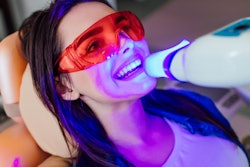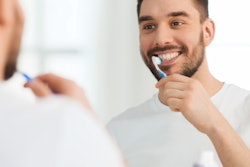
Several subscribers to my free weekly Newsletter, Belly Bites, have asked how to safely whiten their teeth. I first wrote about this topic years ago, but I wanted to share an updated version with you.
There are more whitening options than ever before, and some of them are even dentist recommended! Does that make them a safe choice for your mouth? Does a whiter smile indicate better oral hygiene? The ads would certainly like us to think so.
Let's look at some of the "ins" and "outs" of teeth whitening. Then, you make the choice that's right for you.
How whitening works
 Dr. Alvin Danenberg..
Dr. Alvin Danenberg..Most whitening methods use a form of bleach (like carbamide peroxide or hydrogen peroxide) to remove stains that are considered unsightly. Other whitening methods are basically chemicals that have various degrees of abrasiveness to "polish" away the stain.
Many dentists offer an in-office, teeth-whitening procedure that uses a peroxide gel and a proprietary blue light to whiten your teeth quickly and effectively. Some tooth whitening procedures done in the dental office also incorporate ozone to enhance the process.
In-office vs. at-home teeth whitening
People have different reasons to whiten their teeth. If you just want a brighter smile than you currently have, teeth whitening may be for you -- either an in-office procedure or an over-the-counter product.
Certainly, if a person wants to get a "brighter and whiter smile" for a special occasion like a wedding picture, then have your teeth whitened with an in-office, teeth-whitening procedure that will produce a beautiful result relatively quickly. Your mouth should be examined by a dentist to be sure it is healthy before this procedure is done.
If you want a "brighter and whiter smile" all the time for your natural teeth, you may need to repeatedly "touch up" your newly created white smile. This can be done with gels that are applied to the teeth with bleaching trays or bleaching strips that adhere to the front surfaces of the teeth to be whitened. I will discuss a potential problem with frequently repeated touch-up measures later in this article.
However, these bleaching procedures will only lighten the surface of natural teeth. They will not change the color of existing filings, crowns, or veneers. So, after you've lightened your natural teeth with a bleaching procedure, any artificial surfaces on your teeth would look darker compared to the natural teeth.
Also, if you have deep internal discolorations in your tooth or teeth, whitening procedures generally will not work as well for you.
Remember, teeth have a natural color. Chalk white, which is the goal of some people, is not a natural tooth color.
Natural ways to whiten teeth
One natural way to whiten your teeth is with a homemade paste of baking soda and filtered water. The paste should be applied to the enamel of the teeth and scrubbed with your toothbrush for a few minutes and then rinsed off with water.
The baking soda is salty tasting and slightly abrasive. It could be used a couple times a week and will remove some stain on the surface of the enamel, but it will not get the teeth as white as a chemical procedure done in a dental office or with at-home chemical whiteners.
Be aware: If you aggressively brush this baking soda paste into the gum surface or exposed root surface, it could be too abrasive and cause irritation to the gums and sensitivity to the root surface.
Another method would be to mash one strawberry into a small bowl and add 1/2 teaspoon of baking soda. Strawberries contain malic acid, which has stain-removing qualities. Use this paste as I described above for the baking soda paste technique. This paste also could cause irritation and sensitivity as I previously mentioned.
A note about activated charcoal
There have been anecdotal reports of using activated charcoal to whiten teeth. However, activated charcoal is a binding agent, which has been shown to attach to various beneficial nutrients and interfere with their absorption into your body. Also, there is no clinical research to substantiate the broad claims made by companies marketing charcoal toothpastes.
In addition, the excessive abrasiveness of activated charcoal could possibly damage or remove the outer layer of the tooth, which is the enamel. If some of the enamel is removed by activated charcoal, a more yellow under layer of the tooth called dentin will become exposed. The exposed dentin will stain more easily than the enamel and could cause tooth sensitivity. And the lost enamel will never regrow.
Potential harms of teeth whitening
Peroxides used in the chemical whitening procedures could weaken the enamel. However, eating nutrient-dense foods will allow natural remineralization of any damaged enamel surface.
It is possible that peroxides could cause significant gum irritation or root sensitivity. Most of these uncomfortable side effects will resolve in a short period of time. These side effects rarely last a long time.
As I already described, activated charcoal could permanently remove some of the enamel causing discoloration and sensitivity.
There are also larger concerns about peroxides on overall health, as explained in an article published in the Australian Dental Journal in March 2017. The study investigated the systemic effects of 9% peroxide whitening gels placed into bleaching trays and then inserted on the upper and lower teeth in the experimental group. The trays were worn by 23 subjects in this study for 30 minutes each night for 14 consecutive days.
Blood samples of study participants showed a significant increase in three specific biomarkers for systemic oxidative stress after teeth whitening. Oxidative stress is a chronic process in the body that could contribute to disease in virtually every organ. Excessive oxidative stress leads to chronic inflammation, which can lead to various chronic diseases over time.
The cause of the observed oxidative stress in this study was probably due to peroxide that was either swallowed and then entered the gut or permeated through the gum tissues and then entered the blood system. Therefore, frequent long-term use of at-home bleaching protocols using peroxides might eventually lead to chronic diseases because of oxidative stress.
Teeth whitening isn't permanent
Any whitening procedure will not last. Natural foods that have staining capabilities like tea, coffee, red wine, and blueberries will continue to stain the enamel of the teeth. If these stains cannot be removed by normal brushing or the natural teeth-whitening methods I described above, then additional teeth-whitening chemical procedures may need to be repeated indefinitely.
There is also no health benefit to whitening teeth. This is a cosmetic procedure that creates a cosmetic result. But the result can be beneficial to a person's self-esteem.
Here are a few caveats to consider before whitening your teeth:
- Teeth-whitening protocols can cause tooth root sensitivity and gum irritation that is usually short-lived but in rare cases may last a long time.
- Whitening is not permanent. Eating foods that stain the teeth will darken the teeth again. Therefore, more teeth-whitening procedures will be required to regain the whiter tooth color.
- Teeth-whitening will not whiten existing dental fillings, crowns, or veneers.
- Using peroxide gels in trays or strips on a repeated basis over a long time may cause oxidative stress and result in various chronic diseases.
So, whitening your teeth for a special occasion won't do irreparable harm. However, I'd think twice before engaging in whitening treatments on a regular basis.
Dr. Alvin Danenberg has retired from the private practice of periodontics in Bluffton, SC. He continues to be on the faculty of the College of Integrative Medicine and created its integrative periodontal teaching module. He also spent two years as chief of periodontics at Charleston Air Force Base earlier in his career. His website is drdanenberg.com.
The comments and observations expressed herein do not necessarily reflect the opinions of DrBicuspid.com, nor should they be construed as an endorsement or admonishment of any particular idea, vendor, or organization or as medical advice.



















